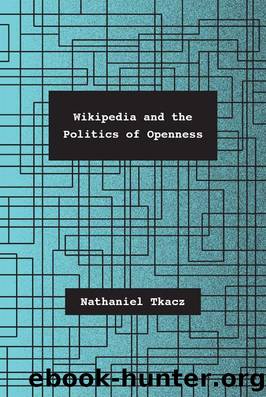Wikipedia and the Politics of Openness by Nathaniel Tkacz

Author:Nathaniel Tkacz [Tkacz, Nathaniel]
Language: eng
Format: azw3
Publisher: University of Chicago Press
Published: 2014-12-19T00:00:00+00:00
âBody of Officialsâ
What to make of Weberâs body of officials, his âstaff of subaltern officials and scribes of all sortsâ (Weber 1958, 197)? While it is not possible to develop a full theory of agency in relation to governance, I want to use this final section to make some general observations on these difficult mattersâthat is, on the governing role and capacity of humans in organizations, on their capacity for authority. Thus far, it might seem as though there is no room for this third member of the trilogy of governance, that governance is what happens to people in an organization, but the story is more complicated. In fact, it is already hinted at in Weberâs primary distinction between âsubaltern officials and scribesâ: on the one hand, a position âunderneath,â one who carries out tasks cast down from âaboveâ; on the other, the inscriber, who acts upon the holy documents and who creates the implements that become the âaboveâ of others.
Wikipedia has a hierarchy of human roles that are defined in terms of access and permission. While there are a range of specialist user-access levels,40 the basic structure, in order of least to most access, is as follows: blocked user, unregistered user, new user, autoconfirmed user, administrator (sysop), bureaucrat, and steward. Other than blocked users, all users can edit pages. However, unregistered and new users cannot edit semi-protected pages (or controversial pages) or upload files (such as images). Autoconfirmed users are ones whose account is at least four days old and with at least ten edits. These users can upload files, edit semi-protected pages, and also move pages (if they have been renamed, for example). Beyond these basic access levels there is quite a leap. The access level of administrator and everything above must be granted by the community. Bureaucrats can add and remove administrators and add (but not remove) other bureaucrats. Stewards can add and remove both administrators and bureaucrats, and the role of steward is attained via election. Administrators, bureaucrats, and stewards can all edit fully protected pages (such as the front page and highly controversial pages); delete and protect pages; block and unblock users; and ascribe certain permissions to specific users (such as rollback or ipblock-exempt rights). As users participate more in the project (in ways considered constructive), they gain the ability to edit controversial content. From administrator and above, however, users gain not only access to new editing tools and permission to edit controversial content, but also the ability to act on other users (e.g., block, unblock, promote). I must stress, however, that this is a very basic sketch of what is in reality a much more nuanced hierarchy.
Without denying the significance of the hierarchy, whose specificity I will return to below, I want to suggest that the governing role of users does not derive from these roles per se. Roles based on access and permission are not the primary manifestation of human authority. Or, more precisely, these roles provide a very specific set of capacities that capture only a very small segment of the overall governance of the project.
Download
This site does not store any files on its server. We only index and link to content provided by other sites. Please contact the content providers to delete copyright contents if any and email us, we'll remove relevant links or contents immediately.
Invention by James Dyson(792)
The Ten Equations That Rule the World by David Sumpter(738)
Thinking Better by Marcus du Sautoy(734)
Concepts of Space by Jammer Max;(698)
Wanting by Luke Burgis(680)
God and the Multiverse by Victor J. Stenger(679)
Merchants of Doubt by Erik M. Conway(665)
How We Got to Now by Steven Johnson(647)
Factfulness by unknow(624)
The Surrender Experiment by Michael A. Singer(596)
The Smallest Lights in the Universe by Sara Seager(552)
On Creativity by Bohm David(548)
Floods, Famines, and Emperors: El Nino and the Fate of Civilizations by Brian Fagan(522)
The Scientist and the Psychic by Christian Smith(514)
Ancient Knowledge Networks by Eleanor Robson;(511)
Why Birds Matter by University of Chicago Press(510)
The Science of Being Lucky: How to Engineer Good Fortune, Consistently Catch Lucky Breaks, and Live a Charmed Life by Peter Hollins(500)
The Oxford Handbook of Philosophy of Mathematics and Logic by Stewart Shapiro(481)
Flood by Design (Design Series) by Mike Oard(455)
